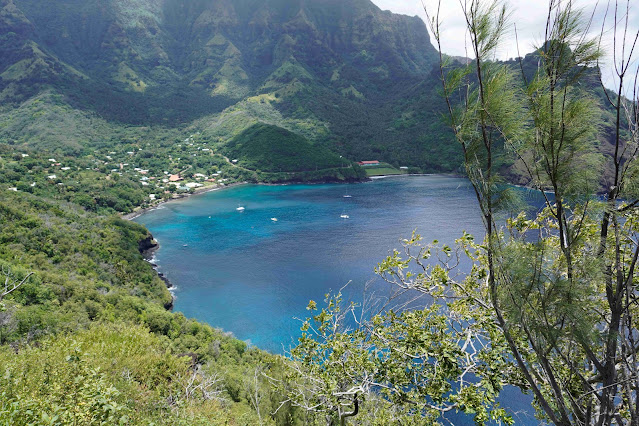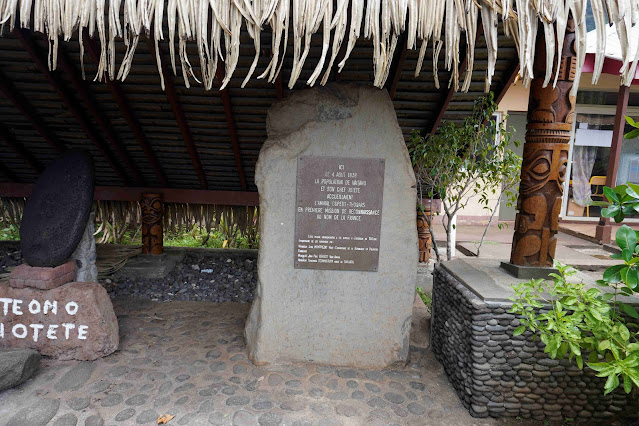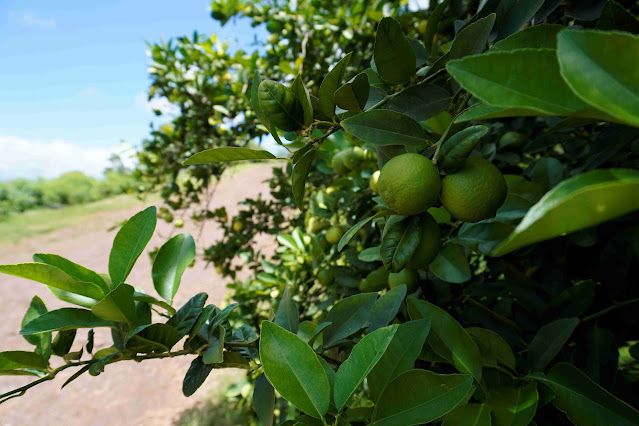- Get link
- X
- Other Apps
I empty two buckets of water over myself. I stand at the stern and look out to sea while I soap myself up. Shampoo doesn't foam when you use it with salt water. Maybe it's because the object is so dirty. In the background, the drums are beating in Vaitahu, the small village on Tahuata, in the bay of the same name, where we are currently lying. It sounds as if a war dance is taking place there. I can't help thinking that the cooking pot has already been prepared to serve us as a feast. The drumming sounds aggressive and continues for quite a while. I jump into the water, which I have no trouble doing at over 28°C. If I'm going to end up in the cooking pot, at least I'll end up clean.
 |
| Anchorage Vaitahu, Tahuata |
However, when we went ashore today to get to know the island, there was no sign of aggression. On the contrary, the people here are very nice and friendly. But of course we prepared ourselves and read up on the history of the Marquesas. The individual clans, which were divided into valleys, fought each other to the death and quite a few of the inferior enemies ended up in the pot. Men of low rank and women in general did not eat human flesh. However, those days are gone, what remains are the traditions and the various rituals that go hand in hand with loud drumming. The first European to discover Tahuata was the Spaniard Alvaro Mendana de Neira, on July 25, 1595, who spent a few days in the bay of Vaitahu, which he called "Bay of the Madre de Dios". 180 years later, in 1774, James Cook came to this bay. But the Marquesas were not so easy to proselytize. It was not until 1838 that Dupetit-Thouars sent missionaries to Tahuata, which he found on his second visit in 1842.
 |
| Memory of Dupetit-Thouars |
Sweat is pouring and dripping unstoppably onto the concrete slabs that mark the road to Motopu, in the north-east of the island. Like a truck filled with concrete, we leave a dripping trail behind us. A cross can be seen on the hill to the north of the anchorage and we want to know what it is all about. We have prepared ourselves well. In addition to good footwear, we also have a bottle of water with us this time. We pick one from the numerous lemon trees along the way and squeeze the juice into the bottle. The lemons here are only the size of a table tennis ball, but they have an intensity that is second to none. One of these little things is enough for a 1.5 liter bottle. Part of the route is steeply uphill. We seek the shade under the large trees, which is very pleasant but doesn't help much. A cool breeze blows over the ridge and we enjoy the view of the bay and the west coast of Tahuata. Below the cross stands a statue of the Madonna protected by a small, artificial grotto. The concrete slabs have now given way to a gravel road and we follow the road further north. Hiva-Oa is only separated by a narrow channel and we can see the southwest coast. There are many farms up here. Lemons, mangoes and coconut palms are cultivated.
 |
| Lemon tree on Tahuata, Marquesas |
From time to time, we also find a few pigs in a small shed. As it's too far to walk to Motopu, we turn around at some point and walk back to the village. Jimmy doesn't feel like working today, but he has kindly left the internet open so we can rest on a bench under a shady mango tree and check our messages. Unfortunately, the 10 GBytes on my pre-paid card have already been used up for this month, so open wifi is always very helpful. We would also have liked to have a drink and we are a little hungry, but here in French Polynesia we have become accustomed to the fact that there are no restaurants in the conventional sense. Even at Jimmy's you have to pre-book via WhatsApp and hope that other guests have found their way to Jimmy. So we have no choice but to return to the boat and raid our food stocks. Ultimately, as a half-Swabian, I much prefer this anyway, as you can save some money and because we are traveling on a low budget, it helps the travel budget immensely.
Nevertheless, we still need to get to the bottom of the drumming and so we can't leave our anchorage just yet. We are all too curious to find out what the drumming is really all about. That's why we're staying a little longer to solve this mystery. Until then, we wish you always fair winds and keep a stiff upper lip.
- Get link
- X
- Other Apps

Comments
Post a Comment